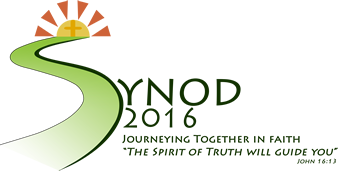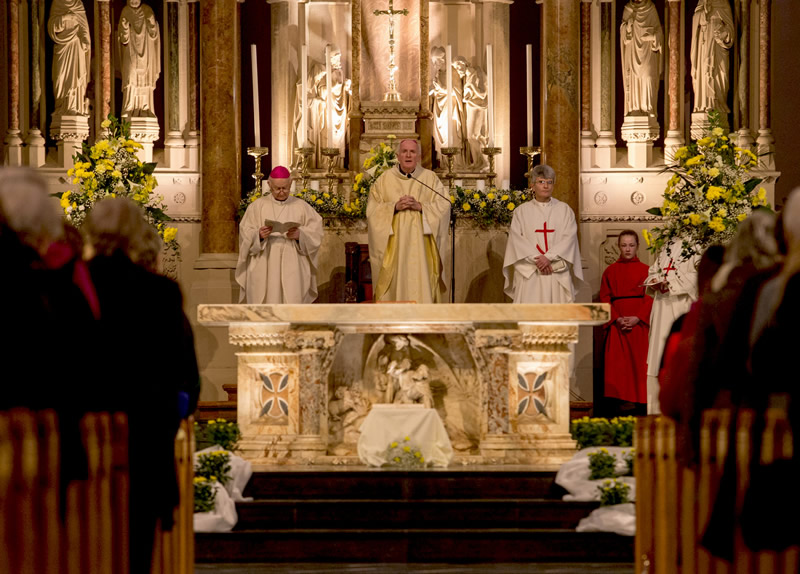Opening Mass of the Limerick Diocesan Synod
First Irish Synod in half a century and first ever with such major participation of lay women and men begins in Limerick
400 delegates to consider 100 proposals across six themes to create new beginning for Diocese
Divine Mercy Sunday, 3 April 2016, St. John’s Cathedral
Homily Notes
The opening Mass for our Diocesan Synod is taking place today, Divine Mercy Sunday, in the middle of a Jubilee Year of Mercy. It wasn’t planned with all of that in mind, but the coincidence is providential. A Synod is rooted in God’s mercy.
The Gospel today presents us with Easter stories of mercy. On the one hand, the episode of the disciples who had experienced the Cross encountering the Risen Jesus. He is re-creating the community in order for them to begin again together in mission.
On the other hand, there is the story of Thomas, called the Twin, the one we sometimes refer to as “doubting Thomas” because, unlike Mary Magdalene, the great witness of the Resurrection, Thomas initially refused to believe that Jesus was risen from the dead. He was all too familiar with his version of the story that he had probably gone over repeatedly in his mind – initial enthusiasm in following Jesus but then the scandal of the Cross, bitter disillusion and presumably major questions about the future…
Thomas, however, came through the trial of disbelief and doubt to an even deeper faith, a new experience of the God humanised in Jesus Christ whom he calls “my Lord and my God”. Once the Risen Jesus appears to him, showing him his hands – and these are the hands that were lifted up on the Cross, the sign that Jesus said would draw people towards him in the new community of faith, hope and love –, Thomas believes.
The gift of faith comes alive for him and with eyes of faith and love Thomas now sees how mercy works – in the very situation where everything appears to have collapsed, the Risen Crucified Jesus is present, re-building his Church. We know that Thomas went on to become one of the great missionaries of the Church, the one who went outside a certain comfort zone, his known world at that time, the Roman Empire, to bring the Gospel as far as India.
In handing on this story about Thomas to us, the first Christians whose lively community we heard about in the First Reading have left us a valuable message, also for us as we move into our Synod. The faith experience regarding the Church of Jesus Christ can go through the trial of scandal and disbelief, discouragement and disillusionment.
While the Church in many parts of the world is booming with creativity, we know that in Ireland we are experiencing a certain spiritual tiredness in a Church that is so often today referred to in terms of its failures, its wounds, its pierced side. Many in our day will say they are only hanging on in faith and in the Church by their fingertips. But, just as in the case of Thomas, our difficulties in belief and those of our contemporaries can often be the archway under which we pass to enter into a new experience of God present among us precisely when we least expect him. No one is excluded from the gift of faith and love that Jesus Christ offers. He can surprise us. He can re-ignite the fire of mission in our lives even when we feel disappointment and limits.
I was struck years ago when I read a text from an ageing Carlo Carretto, a member of the Little Brothers of Jesus, an order inspired by the spirituality of Charles de Foucauld. In his “Ode to the Church” he commented:
How baffling you are, my church, and yet how much I love you! You have made me suffer more than anyone and yet I owe more to you than to anyone. I should like to see you destroyed and yet I need your presence. You have given me much scandal and yet you alone have made me understand holiness. Never in this world have I seen anything more compromised, more false, yet never have I touched anything more pure, more generous or more beautiful. Countless times I have felt like slamming the door of my soul in your face – and yet, every night, I have prayed that I might die in your sure arms! No, I cannot be free of you, for I am one with you, even if not completely you. Then too – where would I go? To build another church? But I could not build one without the same defects, for they are my defects. And again, if I were to build another church, it would be my church, not Christ’s church. No, I am old enough, I know better.
Our Diocesan Synod, the first in eighty years and the first with such a major participation of lay women and men delegates is a time to re-ignite hope and new beginnings. We are to be “the first Christians” of the twenty-first century ready to build Christ’s Church today with a renewed ardour and the fire of holiness. To do this we certainly need to acknowledge in humility the defects of the Church, able to say truthfully, “they are my defects” but all the time wanting to take both the good and the bad of our Church life and deciding to do our part to repair and remedy, to improve things, and thereby radiate Christ in our communities and our families, in our schools and social projects, among our young people and in our liturgy.
The Synod is not just limited to the four hundred delegates. As the delegates work their way through the three days I believe the Lord is calling the whole Diocese to take five significant steps to help us all begin together again in mission.
Firstly, we need to acknowledge the failure and disappointment we see in our own wounds, those at the heart of the Church, in all that has not been right in the Church, in the complex situations of the world around us.
Secondly, rather than immediately tackling issues head on, just as it was for the disciples and Thomas on that second Sunday of Easter we need to encounter Jesus Christ who is the face of God’s mercy and immerse ourselves in his mercy. In uniting ourselves with the Risen Jesus, we contemplate the mystery of the life of the Trinity dwelling within us and among us, forming us in holiness and offering us the possibility of seeing things with new eyes of mercy.
Thirdly, in looking with eyes of merciful love on the world around us, we are invited to offer ourselves anew as instruments of the mission of Jesus Christ, letting him make of us “other Christs” with a new perspective on life. From the Gospel we learn that a privileged place of encounter with Jesus Christ is our brothers and sisters who are the prolongation of the incarnation for each of us: “As you did it to one of these, the least of my brethren, you did it to me” (Mt 25:40). We give and we receive.
Fourthly, in our renewed missionary outreach we need to form living cells of the mystical Body of Christ, resurrecting relationships of faith, hope and love all around us, oases of mercy where many can come, saint and sinner alike, to communicate and speak of the experience of faith and spiritual life. This will lead to a new sense of just what a gift it is to know the wounded Risen Jesus Christ present in and through his Church, communicating his life-giving Gospel message, offering us sacramental encounters with him and actively building up missionary networks of communion.
Fifthly, having been made more fit for mission by our Synod, the Diocese will go forward better able to make its contribution to the renewal of society by offering a “soul” dimension to all aspects of life – from education to politics, from family to health, from art to science, from sport to city-planning, from business to agriculture and the environment….
May the Holy Spirit inspire us as we take these steps. As we express gratitude for the gift of faith handed on by our ancestors, may our Synod bring joy to heaven.
One last thought. At the start of the homily I mentioned the providence of today being Divine Mercy Sunday and today’s Gospel focus on the encounter with the Risen Crucified Jesus Christ. I’d like to conclude by referring to another sign of providence in the form of an encounter with Mary, the Mother of Jesus.
Tomorrow, Monday, the icon of Our Lady of Perpetual Help will be brought in procession through the streets of Limerick as it begins its pilgrim journey around the Cathedrals of Ireland. This is indeed a providential sign for us – Our Lady, the Mother of Jesus and our Mother, is with us. She will assist us. She will untie any knots that occur. Let us entrust ourselves and our Synod to her, the pattern and model of the Church.
Mary, the Mother of Mercy surely wants us to take to heart the words we hear the Risen Jesus say in our Second Reading that seem so apt for our Synod: “Do not be afraid… I am the Living One. I was dead and now I am to live for ever… Now write down all that you see of present happenings and things that are still to come”.

